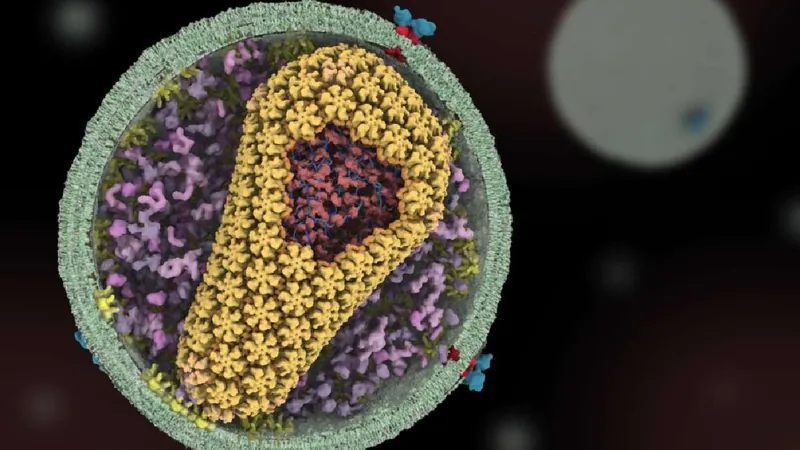
Breakthrough in HIV Prevention: U.S. Biochemist’s Research Paves the Way for Revolutionary New Drug
2024-12-28
Author: Ling
In 2023, the World Health Organization reported a staggering 630,000 global deaths due to HIV-related illnesses. However, researchers are optimistic about a significant decline in these numbers, thanks to groundbreaking discoveries made by Wesley Sundquist, a biochemist at the University of Utah.
Sundquist's laboratory has been instrumental in laying the groundwork for lenacapavir, a groundbreaking drug developed by Gilead Sciences. Recently, lenacapavir was honored as "Breakthrough of the Year" by the prestigious journal Science, highlighting its potential to alter the course of the HIV/AIDS pandemic dramatically.
Science referred to lenacapavir as "a pivotal step toward diminishing HIV/AIDS as a global health crisis," reflecting the potential impact of this novel treatment on public health.
While the University of Utah did not develop lenacapavir independently, Sundquist played a crucial role as a consultant, lending his expertise based on extensive research into the molecular structure of HIV and its interactions within the human body. Sundquist's team has spent decades studying how the HIV virus is constructed and how it spreads through human cells.
"We began our research in the late '90s," Sundquist explains as he discusses the painstaking efforts to purify and analyze the protein shell surrounding the virus's genetic material. This research illuminated the structure of the shell and revealed its sensitivity to molecular changes. Even minor adjustments to the proteins that make up this viral shell hindered its replication, indicating that drugs targeting this protein structure could be effective in fighting HIV.
Gilead Sciences recognized the significance of Sundquist's work and enlisted his guidance in developing lenacapavir, which acts by binding to the viral protein shell, thereby preventing the virus from assembling correctly and entering the nucleus of host cells.
What sets lenacapavir apart from existing anti-HIV treatments is its longevity and potency. Unlike current medications that require daily dosing, which can lead to patient noncompliance, lenacapavir can prevent HIV infection for up to six months with just a single injection. "It's reminiscent of a vaccine in its long-lasting effectiveness," Sundquist notes. "For individuals at risk of HIV, this is truly groundbreaking."
The drug has shown remarkable results in clinical trials conducted in HIV hotspots like South Africa and Uganda. In a population of over 2,000 women who received lenacapavir, not a single individual contracted HIV during the study. "Lenacapavir almost completely prevents the transmission of HIV in at-risk populations," Sundquist reported, expressing his excitement over the drug's efficacy.
Recent follow-up trials have reinforced these results among diverse populations, including men and nonbinary individuals. The encouraging outcomes not only contribute to controlling the epidemic but also ignite hope for future developments in HIV treatment.
At the core of Sundquist's research ethos is an insatiable curiosity about molecular processes. "We are driven by the quest to understand complexities that remain elusive," he stated. Although much of the drug development work is now beyond his lab's scope, Sundquist is hopeful about future innovations, with Gilead Sciences exploring the possibility of extending lenacapavir's duration to an impressive year.
Despite the tremendous strides made, Sundquist emphasizes that the journey is not yet complete. "The ultimate goal is to develop a vaccine that would provide universal protection," he said, acknowledging that while progress has been made, the quest for an HIV vaccine remains a formidable challenge.
This new chapter in HIV prevention represents a monumental leap forward, and the scientific community remains vigilant as they continue to push the boundaries of what is possible in the fight against this global health crisis.
 Brasil (PT)
Brasil (PT)
 Canada (EN)
Canada (EN)
 Chile (ES)
Chile (ES)
 Česko (CS)
Česko (CS)
 대한민국 (KO)
대한민국 (KO)
 España (ES)
España (ES)
 France (FR)
France (FR)
 Hong Kong (EN)
Hong Kong (EN)
 Italia (IT)
Italia (IT)
 日本 (JA)
日本 (JA)
 Magyarország (HU)
Magyarország (HU)
 Norge (NO)
Norge (NO)
 Polska (PL)
Polska (PL)
 Schweiz (DE)
Schweiz (DE)
 Singapore (EN)
Singapore (EN)
 Sverige (SV)
Sverige (SV)
 Suomi (FI)
Suomi (FI)
 Türkiye (TR)
Türkiye (TR)
 الإمارات العربية المتحدة (AR)
الإمارات العربية المتحدة (AR)